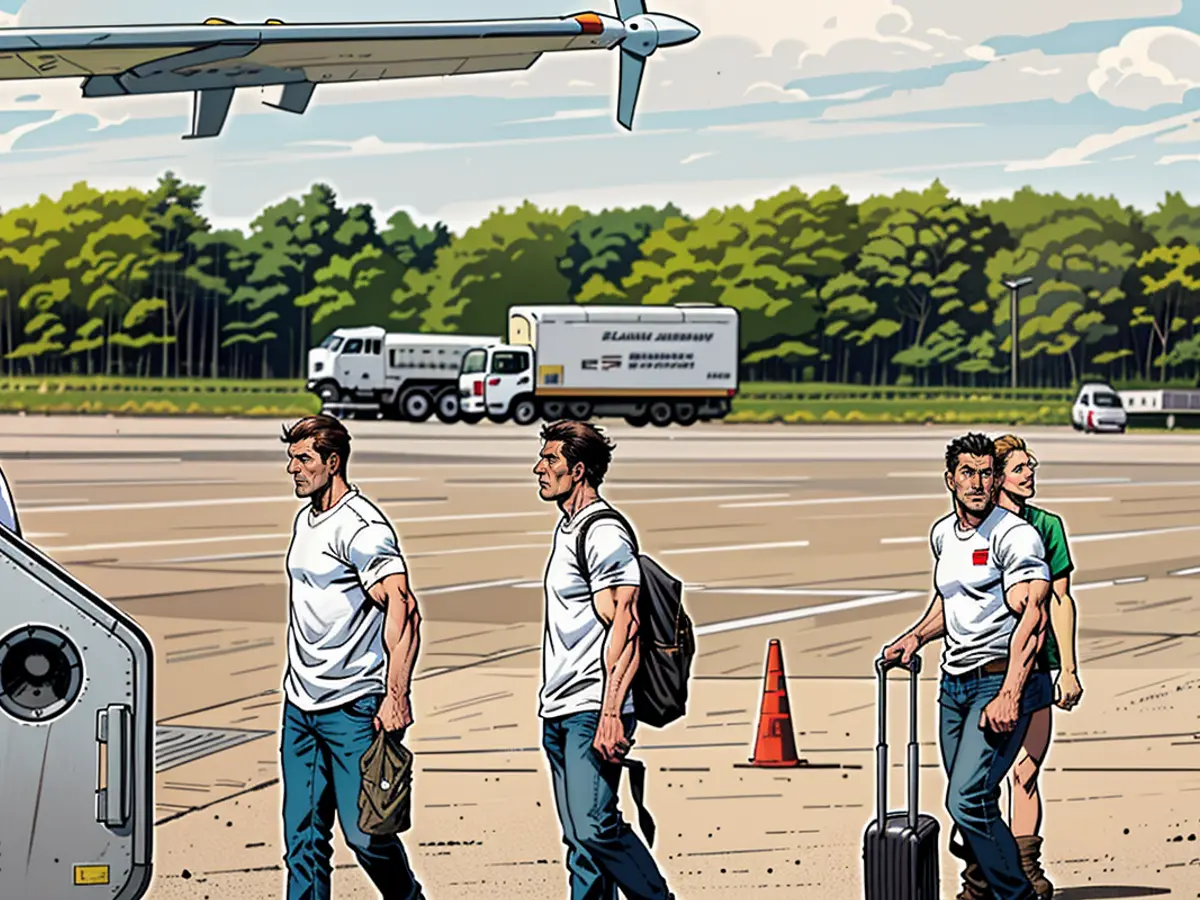Plane flies empty several times across the country for DFB team
The UEFA promises the "most sustainable European Championship ever", but for the participating teams, this promise apparently only applies conditionally. The DFB team's flight journey to the quarter-final in Dortmund, according to a report by the news magazine "Spiegel", involves several empty legs.
The flights of the German football national team from their EM quarters in Herzogenaurach to the quarter-final in Dortmund and back cause a cascade of positioning flights, as researched by "Spiegel". The Lufthansa Airbus A319, which transported the German footballers to the Denmark match from Nuremberg airport and back, had to complete a total of six legs for this tour - four of them without passengers.
Lufthansa confirmed this to "Spiegel" upon request. The reason for these so-called positioning flights is that the DFB-chartered plane with the registration D-AIBE is currently in regular Lufthansa flight plan use from Munich. This flight plan sends the Airbus 319 on a journey through Germany: first, it flew empty from Munich to Nuremberg on Friday to transport the DFB players to Dortmund. On Friday evening, it then flew empty back to Munich, as it is used by Lufthansa for a flight to Naples and back on Saturday.
Over 1800 kilometers round trip
According to Lufthansa, the jet should then fly empty to Dortmund on Saturday: to transport the national team back to Nuremberg after the Denmark game. On Sunday morning, flight number six should take off: an empty flight back to Munich. On its journeys through Germany, the A319 will cover more than 1800 kilometers. Especially on short flights, the emissions per kilometer are relatively high in comparison to long-haul flights.
"In the takeoff phase, when an aircraft climbs, it needs a lot of energy. Correspondingly high are the emissions," said Felix Creutzig, professor at the Technical University of Berlin, to the magazine. "Short-haul flights therefore have significantly higher CO2 emissions per kilometer than long-haul flights."
The DFB chartered the plane because the association considered the journey by bus to be too long. The distance between Herzogenaurach and the stadium in Dortmund is about 420 kilometers by land. The distance "is 'too far' in the context of sports considerations to travel by bus or train," said a spokesperson for the association to "Spiegel". Climate scientist Creutzig, however, had reservations about the time savings with flying: "With the access to the airport and from there to the hotel, the time savings with flying should be kept within limits."
Criticism from environmentalists
Environmentalists have criticized the DFB for its extensive use of charter flights for the European Championship. "The DFB is setting a bad example with its excessive use of charter flights for the European Championship," said Jürgen Resch, transport policy spokesman for the German Environmental Aid (DUH), to the "Spiegel". "The DFB could have easily traveled by train and bus, which would have saved a lot of CO2 emissions."
The DFB defended itself against the criticism, stating that the team's schedule did not allow for long journeys by public transport. "The team's schedule is very tight, and it is not possible to travel by train or bus to all the games," said a spokesperson for the association to the "Spiegel".
However, the environmental organization Transport & Environment (T&E) calculated that the German team could have traveled to all their matches by train and bus, covering a total distance of around 2,500 kilometers. This would have saved around 100 tons of CO2 emissions. "The DFB's excuse that the team's schedule is too tight is not convincing," said T&E aviation policy manager Andrew Murphy. "The team could have traveled by train and bus and still arrived on time for all their matches."
Environmental activists are disappointed. "The DFB stages an absurd flying hopping for the national team and wastes this entire series of ultra-short flights, undermining every sustainability claim of the EM," says Marion Tiemann, transport expert from Greenpeace. "Fans are supposed to travel by bus and train, but the DFB lets a plane fly empty multiple times across Germany for the national team. A direct ICE train would bring the players to their destination in less than five hours. In light of the catastrophic flooding of the past weeks, such extremely climate-damaging short flights should be banned - the DFB apparently wants to make them socially acceptable again.
In the past few days, a short-haul flight of the Turkish national team caused debates: They jetted from Hannover to Hamburg, although the distance is only about 150 kilometers and there are numerous direct train connections. The European football association UEFA promotes the tournament as "the most sustainable European Championship of all time".
- Greenpeace criticized the DFB for their extensive use of charter flights during the European Football Championship, stating that it undermines the UEFA's claim of having the most sustainable European Championship.
- The National soccer team's flight journey to the quarter-final in Dortmund, despite the promise of a sustainable European Championship by UEFA, involved several empty legs, as reported by Germany's National newspaper, Die Spiegel.
- German Railways (Deutsche Bahn, abbreviated as DFB in the context of soccer) could have saved a significant amount of CO2 emissions if they had traveled by train and bus instead of charter flights for the European Football Championship, according to environmental organization Transport & Environment (T&E).
- During the European Football Championship 2024, various international teams, including Germany's national soccer team, relied on charter flights to cover short distances, despite the high emissions per kilometer these flights produce, as discussed by climate scientist Felix Creutzig with Die Spiegel.






